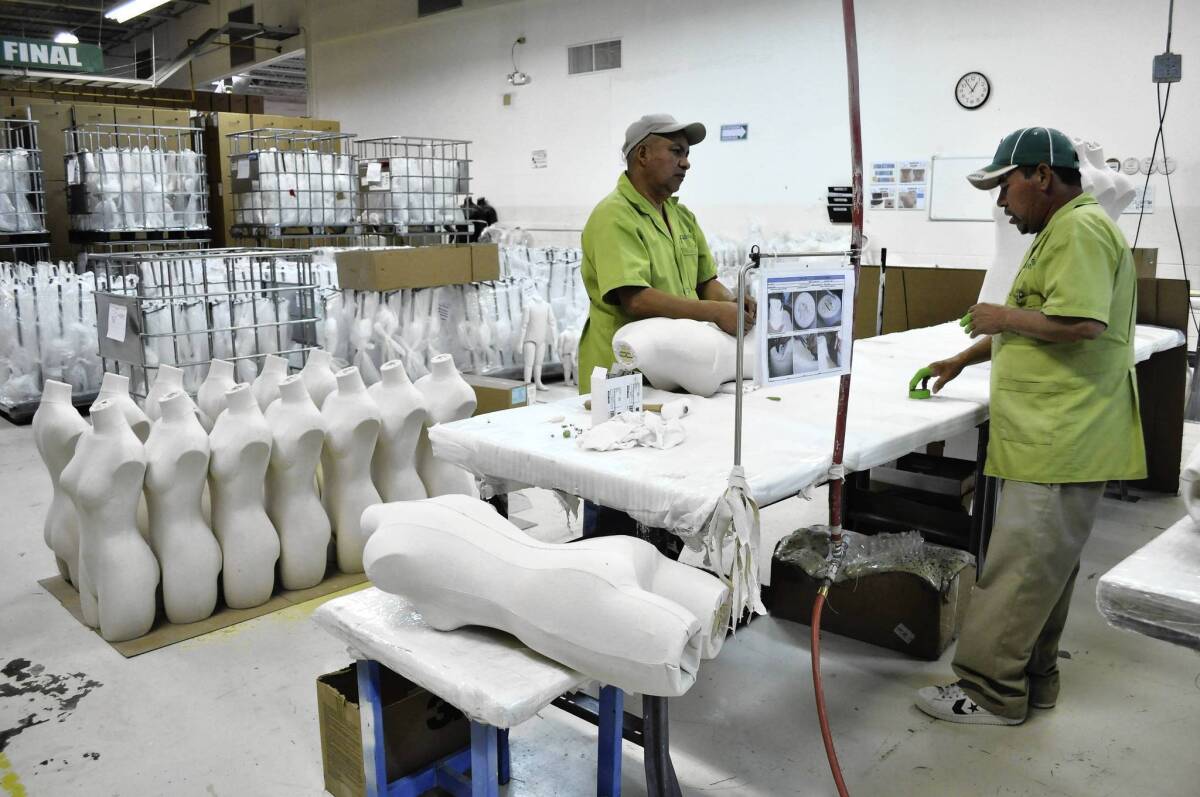Mexican businesses vow fight on new tax laws

- Share via
MEXICO CITY — Hardly had the ink dried on President Enrique Peña Nieto’s contentious $14-billion tax plan when big business — especially the powerful maquiladora industry on Mexico’s border with the U.S. — raised a loud voice of protest, vowing to fight a package that opponents say will cripple industry.
Major business groups, after weeks of unsuccessful lobbying, said Friday they would mount legal challenges to block the plan, which won final congressional approval Thursday and would raise taxes on border enterprises including the thriving maquiladoras, as the export-centered assembly plants near the border are known.
Finance Minister Luis Videgaray said he was confident the government would prevail over the challenges. “We are ready for them,” he said in a radio interview Friday.
He accused many businesses of a form of tax evasion and said the new regulations would close numerous loopholes. Mexico has one of the lowest tax-collection rates in the developed world.
Until now, border-area businesses — including the maquiladoras, which produce goods including electronics and cheap clothing, most of which are exported to the U.S. — received considerable tax breaks. For example, the sales tax in border states is 11%, compared with 16% in the rest of Mexico. Under the new law, everyone will pay 16%.
Jorge Davila, president of an umbrella group of Mexican Chambers of Commerce, said the changes could cut the region’s sales by up to 6%, cost thousands of jobs, drive away investment and hurt Mexican businesses’ ability to compete with U.S. companies.
“The most important thing [to note] is that in the frontier zone, we must compete not with Mexican companies that operate in the interior of the country but with businesses on the other side of the border,” Davila said.
Another national group, the Coordinating Business Council, said the hikes could erode economic growth in border states by more than 2%. That would be a significant pinch because the northern region is considered the economic engine of the country — the maquiladora industry is particularly productive.
Already, Mexico’s economy is faltering, and once-optimistic predictions of booming growth have been slashed significantly, to as low as 1.2% of the gross domestic product.
In the run-up to this week’s congressional approval, Videgaray said, he entertained the complaints of the business community in a long series of “intense” discussions, but, with some exceptions, entrepreneurs and the government agreed to disagree.
“I think we have a fiscal reform that is progressive, that really attempts to eliminate opportunities for tax evasion, eliminates holes and protects the middle class,” he said.
Videgaray said “genuine maquiladoras,” for example, would pay sales tax on the materials they import for assembly but recoup the money when they export. The businesses, however, will have to be certified by the government as “genuine.”
“There are many companies that pretend to be maquiladoras, that import without paying sales tax and then sell their products domestically, which does enormous damage to the national industry,” Videgaray said.
The fiscal reform package includes other new taxes, but it falls $5 billion short overall of what the government initially proposed.
For the first time, foreign mining companies will have to pay royalties. In a bid to fight Mexico’s rampant obesity problem, the price of sugary drinks was raised about eight cents per liter. A tax was also put on junk food, defined as products with 275 calories or more per 100 grams.
Businesses launched a massive publicity campaign against the taxes. Bottling companies, big food producers, convenience store conglomerates and scores of other businesses took out full-page ads to discourage congressional approval.
Opposition was so fierce on the border — where ordinary citizens are also concerned that a worsening economy will bring back higher levels of drug gang violence that have only recently ebbed — that one newspaper headline in Tijuana referred to “fiscal terrorism.” Members of Congress from the border region who voted in favor of the package were branded “traitors” on social media networks.
A group calling itself the Republic of Baja California announced it would hold a “Caravan of Repudiation” against the federal government this month.
The tax package was approved unanimously by lawmakers from Peña Nieto’s Institutional Revolutionary Party (PRI), with part of the left brought on board after the government dropped plans to slap sales taxes on all food and medicines. The conservative National Action Party (PAN), particularly close to business interests, overwhelmingly opposed the hikes.
“They will put taxes all over the place,” complained PAN Congressman Juan Bueno Torio. “It is a badly designed plan that will hurt economic growth.”
With opposition getting especially noisy, Peña Nieto found himself forced to defend the package, again, on Friday. He invited critics to study and understand the “spirit of the reforms.” They are not “merely a whim,” he said.
News assistant Cecilia Sanchez of The Times’ Mexico City bureau contributed to this report.
More to Read
Sign up for Essential California
The most important California stories and recommendations in your inbox every morning.
You may occasionally receive promotional content from the Los Angeles Times.














